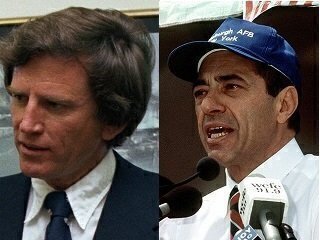Listen up, Donald Trump, Jeb Bush and Hillary Clinton: Early poll numbers aren't always indicators of future presidential success!
The history of national primary polls more than a year away from party conventions shows that early front runners can have serious problems getting across the finish line.

With the exception of most incumbent Presidents seeking their own party’s re-nomination, these early preference polls can be led by potential candidates whose campaigns fizzle out by the time nomination conventions are held.
So current poll leaders Clinton, for the Democrats, and Trump and Bush, for the Republicans should take heed – and take the polling numbers with a grain of salt.
For example, if historic early polling numbers held true a year after they were published, the 2008 presidential race would have featured Rudy Giuliani against Hillary Clinton. The same would have been true for a 1980 election between Edward Kennedy and Ronald Reagan, or a 1992 election between Mario Cuomo (or Jerry Brown) and George H.W. Bush.
Back in 2011, statistician Nate Silver looked at some of these trends in a three-part series for the New York Times.
“The Democrats have tended to have far more exciting primary races, producing several surprising winners,” Silver noted, when there was clear trend in the period between 1972 and 2008 of the GOP front runners having a better finishing record. And in 2012, Mitt Romney was also an early front runner, who survived a roller-coaster ride to gain his party’s nomination.
As for the Democrats, here is how Silver listed the early front runners since 1972 who flopped, along with the eventual nominees:
1972: Edmund Muskie/George McGovern. McGovern was only fifth in the polls a year away from the Democratic convention, where he walked away as the nominee.
1976: George Wallace/Jimmy Carter. The future President Carter was tied for 12th in early polling, well behind former Alabama Governor Wallace and former nominee Hubert Humphrey.
1980: Edward Kennedy/Jimmy Carter. Carter was the rare incumbent President who trailed badly, 54-30 percent, in front runner polling within his own party, before Carter turned his fortunes around.
1988: Gart Hart/Michael Dukakis. Hart and Jesse Jackson were ahead of Dukakis until Hart dropped and re-entered the campaign after a scandal.
1992: Mario Cuomo/Bill Clinton. The New York governor was a strong early favorite, while Clinton was tied for 13th in early polls among Democratic hopefuls. But Cuomo delayed announcing his candidacy and finally decided not to run.
2004: Joe Lieberman/John Kerry. Lieberman had a very early lead in the polls ahead of Kerry and Richard Gephardt, but he withdrew from the primaries in early 2004.
2008: Hillary Clinton/Barack Obama. Clinton led Obama by a 38-23 percent margin in early polling. Obama won the nomination after a long primary campaign.
Looking at other early races, the Republicans also had drama in the pre-1972 period. For example, the 1964 Republican race featured Senator Barry Goldwater leading in summertime 1963 Gallup polling over Nelson Rockefeller. But a change in later Gallup polls had Goldwater, Henry Cabot Lodge, William Scranton and Goldwater lumped together just before the 1964 GOP convention.
Polling in 1967 showed President Lyndon Johnson and Senator Robert Kennedy as the co-favorites for the 1968 Democratic nomination. Humphrey became the eventual nominee after Johnson declined to run and Kennedy was assassinated after the California primary.
In a 2007 report, the Pew Research Center looked at long-term national primary polling trends and saw problems comparing past polling practices to current results.
“The past polling history may be less relevant today. The process is starting earlier than ever this year and while there are some well-known contenders, the public’s level of familiarity with the overall field of candidates is still very low,” Pew noted. The group also said that early polls about the winner of theoretical presidential election races were even more problematic.
“It’s not just the case that polling in the nominating contests is perilous. Polls that test hypothetical general election matchups at this stage in the cycle are mostly wrong about who will win the White House,” Pew noted.







